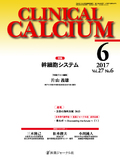Japanese
English
- 有料閲覧
- Abstract 文献概要
- 1ページ目 Look Inside
- 参考文献 Reference
造血幹細胞は定常時には細胞周期が静止状態で,分裂することはまれである。その一方,様々なストレスが負荷されると活発に増殖して分化血液細胞を供給する。こうしたストレス負荷時には,造血幹細胞とその近傍の骨髄微小環境(造血幹細胞ニッチ)が特性を変えて,状況ごとの血液細胞産生に最適化される。近年,こうしたストレス造血時に起こるイベントの形態学的・分子遺伝学的理解が深まっている。本稿では,これらの研究の進展から得られたストレス造血における造血幹細胞とニッチの働きと分子メカニズムについて,最新の知見も含めて概説したい。
At steady state, hematopoietic stem cells(HSCs), the most undifferentiated cells in the hematological system, are kept quiescent in the cell cycle. Upon hematological stresses, including radiation, anti-cancer medication, infection, and transplantation, bone marrow HSCs enter the cell cycle and robustly repopulate the entire hematopoietic system via multi-lineage differentiation and self-renewal, partly due to the alteration of their surrounding microenvironment or niche. Such hematological repopulation activity is termed “stress hematopoiesis,” an activity essential for homeostatic maintenance of blood production. Understanding stress hematopoiesis is also critical to establish efficient methods enabling expansion in vitro of HSCs, since forced activation of the cell cycle by cytokine supplementation induces a stress-like cellular state.



